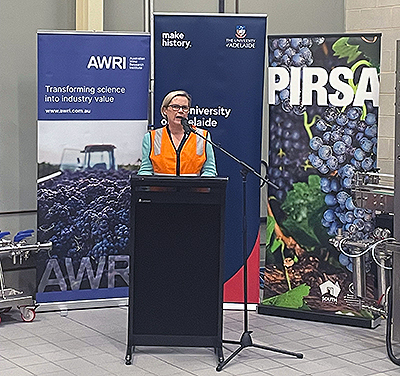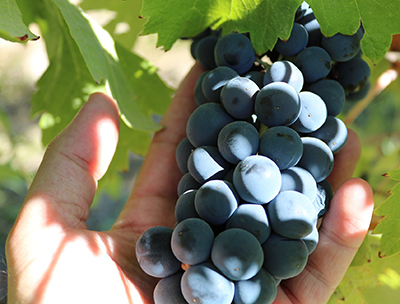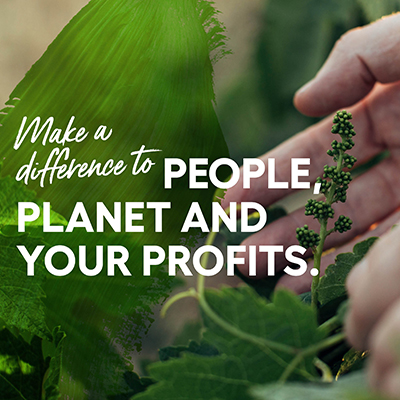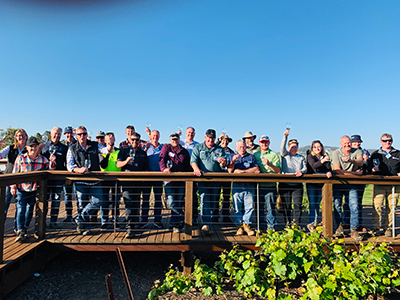NOLO trial-scale facility up and running
First reference genomes published for Shiraz and Sauvignon Blanc
Workshops to help prepare for future smoke events
Affinity Labs offering grapevine ID service
Sustainable Winegrowing Australia membership period opening soon!
WineCloud changing hands, Ferment Simulator to remain
Express your interest in upcoming Advanced Viticulture Courses
Order the latest AWRI publications online
NOLO trial-scale facility up and running |
|
 |
The new trial-scale NOLO facility at the Waite Campus officially opened on 5 April. Managed by WIC Winemaking Services, this facility features a pilot-scale SC-100 FlavourTech spinning cone column, a form of low-temperature vacuum steam distillation used for NOLO wine production. It also has packaging facilities for a diverse range of formats to allow successful trial products to be packaged and used for consumer, trade, market research and export samples. Thanks to investment from the Government of South Australia, through the Department of Primary Industries and Regions, South Australian businesses have priority access to the facility at substantially subsidised rates (up to 15 days’ access per business). Producers from across Australia who are interested in accessing the facility to develop new NOLO wine products should complete this customer application form. For more information about the facility and the services available, contact John Gledhill, Winemaker – WIC Winemaking Services via john.gledhill@awri.com.au or 0429 140 377. |
First reference genomes published for Shiraz and Sauvignon Blanc |
|
 |
The AWRI has just published the first reference genomes for the key grapevine varieties Shiraz and Sauvignon Blanc, following on from earlier studies on Chardonnay and Pinot Noir. This work expands the pool of genomes available for wine-grapes while providing a foundation resource for future whole-genome studies. Interestingly, the data for Shiraz also sheds some light on a genetic basis for the pepper character, rotundone. Following appropriate confirmation, this study could provide a genetic marker for the production of cool climate-associated peppery characters in future grape breeding strategies. Read the open access article in the Australian Journal of Grape and Wine Research here: https://www.hindawi.com/journals/ajgwr/2023/6686706/ |
Workshops to help prepare for future smoke eventsThree workshops on smoke taint will be presented in the Yarra Valley, Canberra District and Adelaide Hills in July. These workshops will tackle a range of questions producers are faced with when dealing with potentially smoke-exposed fruit. Participants will hear results from the latest smoke research projects and taste wines with different levels of smoke character along with wines that have been treated using different remediation options. The goal of these workshops is to support producers to prepare better for future smoke events. View the workshop program or register now. |
|
Affinity Labs offering grapevine ID serviceAffinity Labs has recently expanded its plant testing services to include grapevine variety identification. This service allows growers and suppliers to identify or confirm the variety of their grapevine material. The process involves DNA typing using a single nucleotide polymorphism (SNP) panel made up of 48 SNP markers. This is then compared to the CSIRO grapevine variety SNP database, which contains profiles of approximately 360 Vitis vinifera cultivars used for wine-grape, table grape and dried grape production. Affinity Labs is one of only two laboratories currently offering grapevine variety identification in Australia. For more information visit https://affinitylabs.com.au/grapevine-variety-id/ or contact our customer service team on customerservice@affinitylabs.com.au or 08 8313 0444. |
|
Sustainable Winegrowing Australia membership period opening soon! |
|
 |
Sustainable Winegrowing Australia is the national program for grapegrowers and winemakers to demonstrate and continuously improve the sustainability of their practices. The new annual membership period for the program opens from 1 July. For growers and winemakers interested in learning more about the program, a range of options are available:
If you have any questions about the program, you can also contact the AWRI helpdesk on 08 8313 6600 or helpdesk@awri.com.au. |
WineCloud changing hands, Ferment Simulator to remainThe AWRI WineCloud will not be continuing as an AWRI service from 30 June 2023. Marama Labs, based in New Zealand, has secured the rights to the algorithms used to generate the colour, phenolic and tannin data in the WineCloud, as well as its extensive grape and wine database, which will be built into Marama Labs’ CloudSpec platform. Existing WineCloud users who wish to maintain access to their data and the capability to generate tannin data should contact MaramaLabs via team@maramalabs.com or +64 22 086 4215. Users who wish to extract a copy of their data before the current service ceases should contact Neil Scrimgeour at neil.scrimgeour@affinitylabs.com.au. Meanwhile, the Ferment Simulator will continue to be available from: https://fermentsimulator.com.au/login. This tool allows users to predict ferment outcomes using basic temperature and Baumé data. Powerful algorithms also allow users to model the impacts of temperature, nutrients, mixing and re-inoculation and to respond to problematic ferments quickly during vintage. Access to the Ferment Simulator is free. More information about this tool is available from the Ferment Simulator webpage. |
|
Express your interest in upcoming Advanced Viticulture Courses |
|
 |
The AWRI is holding two Advanced Viticulture Courses later this year (AVC #5: 16–19 October 2023 and AVC #6: 30 October – 2 November 2023). This hands-on, intensive four-day course presents the latest techniques and technologies in viticulture. Participants travel in a small group across a number of SA regions to visit sites and meet practitioners who are at the cutting-edge of Australian viticulture. The course is aimed at practising viticulturists with an interest in innovation and is limited to a maximum of 25 participants to ensure an intensive and interactive learning experience. If you are interested in attending, please complete this expression of interest form. The events team will then get back to you with more details and to lock in your preferred course dates.
Topics covered in the Advanced Viticulture Course include:
The course fee covering accommodation, meals and transport is $3000 per person. |
Order the latest AWRI publications onlineAccessing the latest AWRI publications is easy. Visit the AWRI Publications web page to:
The AWRI’s most recent publications are listed below. 2343 Dixon, R. 2023. Ask the AWRI: Assessing grapes for disease. Aust. N.Z. Grapegrower Winemaker (711): 90-91. 2344 Parker, M., Jiang, W.M., Bilogrevic, E., Likos, D., Gledhill, J., Coulter, A.D., Cowey, G.D., Simos, C.A., Francis, I.L. Herderich, M.J. 2023. Modelling smoke flavour in wine from chemical composition of smoke-exposed grapes and wine. Aust. J. Grape Wine Res. 2023: 4964850. 2345 Reilly, T., Mierczynski, P., Suwanto, A., Krido Wahono, S., Maniukiewicz, W., Vasilev, K., Bindon, K., Mierczynska-Vasilev, A. 2023. Using zeolites to cold stabilize white wines. Aust. J. Grape Wine Res. 2023: 7259974. 2346 Onetto, C.A., Kutyna, D.R., Kolouchova, R., McCarthy, J., Borneman, A.R., Schmidt, S.A. 2023. SO2 and copper tolerance exhibit an evolutionary trade-off in Saccharomyces cerevisiae. PLOS Genet. 19 (3): e1010692. 2347 Dabare, P.R., Reilly, T., Mierczynski, P., Bindon, K., Vasilev, K., Mierczynska-Vasilev, A. 2023. A novel solution to tartrate instability in white wines. Food Chem. 422: 136159. 2348 He, C., Xing, F., Liang, J., Zhang, Z., Zhan, B., Habili, N., Wang, H., Li, S. 2023. The ABI5-dependent downregulation of mitochondrial ATP synthase OSCP subunit facilitates apple necrotic mosaic virus infection. J. Exp. Bot. 2023: erad143. https://doi.org/10.1093/jxb/erad143 2349 Habili, N., Wu, Q., Rinaldo, A., Constable, F. 2023. A chronological study on grapevine leafroll-associated virus 2 in Australia. Viruses 15(5): 1105. 2350 Cowey, G. 2023. Ask the AWRI: Traditional cap management techniques. Aust. N.Z. Grapegrower Winemaker (712): 58-59. 2351 Szeto, C., Lloyd, N., Nicolotti, L., Herderich, M.J., Wilkinson, K.L. 2023. Beyond volatile phenols: an untargeted metabolomic approach to revealing additional markers of smoke taint in grapevines (Vitis vinifera L.) cv Merlot. J. Agric. Food Chem. https://doi.org/10.1021/acs.jafc.2c09013 2352 Onetto, C.A., Ward, C.M., Borneman, A.R. 2023. The genome assembly of Vitis vinifera cv. Shiraz. Aust. J. Grape Wine Res. 2023: 6686706. 2353 Kaur, K., Rinaldo, A., Lovelock, D., Rodoni, B., Constable, F. The genetic variability of grapevine Pinot gris virus (GPGV) in Australia. Virol. J. 2023. https://doi.org/10.21203/rs.3.rs-2885158/v1 2354 Siebert, T. 2023. Chemical basis of ‘stone fruit’ aromas in white wine. Chemistry in Australia (June-August): 40. |
|
Acknowledgements
The AWRI is a member of the Wine Innovation Cluster in Adelaide, South Australia. |
|


